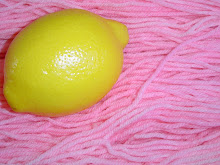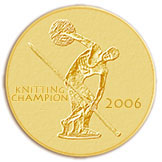A Finished 3 Ply
 After the brake band broke on my Majacraft, I replaced it with some kite string I had sitting around here and was able to finish plying the GCNI/Mohair the next day. I also picked up some fine hemp twine to use when the kite string breaks (it's a two ply polyester and I just don't think its going to hold up to the constant abrasion that brake bands are subjected to). Hopefully this will work! I ended up with almost exactly 300 yards of the three ply which, according to my wraps per inch thingy, is in the DK weight range (I can't remember the exact wpi this yarn came out, only that it was a fine DK weight). I still plan to make socks with it, they'll just be house socks.
After the brake band broke on my Majacraft, I replaced it with some kite string I had sitting around here and was able to finish plying the GCNI/Mohair the next day. I also picked up some fine hemp twine to use when the kite string breaks (it's a two ply polyester and I just don't think its going to hold up to the constant abrasion that brake bands are subjected to). Hopefully this will work! I ended up with almost exactly 300 yards of the three ply which, according to my wraps per inch thingy, is in the DK weight range (I can't remember the exact wpi this yarn came out, only that it was a fine DK weight). I still plan to make socks with it, they'll just be house socks. There were a few questions about the plying from the other day, so I thought I'd answer them today. If you have Judith MacKenzie McCuin's Teach Yourself Visually Handspinning, look on page 103 for pictures and step by step directions for how to hold your singles as you ply. If you don't have her book, go order it now, then while you wait for it to arrive, you can look at this picture of her hands as she does a 4 ply in the class. The trick is getting the singles into your hands like this and then your fiber hand (the one closest to your body) DOES NOT MOVE. It just sits still, letting the singles go through your fingers and automatically adds just enough tension to keep things under control. The forward hand that controls the twist also separates the singles as it slides back towards the fiber hand, allowing the twist to enter the singles and plying them together. Once you get the singles sorted out in your hands, it works great. Everything stays even and the twist enters all the singles at once, twisting them together into a beautiful yarn.

Labels: spinning










6 Comments:
Your yarn looks wonderful, and the plying is sooo even. I guess I'm going to have to break down and order that book! LOL
Thanks for posting the link for the book, definitely need that one! The yarn looks great!!
Hee! You know, I pretty much never use 2-handed plying tactics for anything but 4-ply or more, or sometimes 3-ply depending on the fiber/how it's spun. Or chain plying I suppose. Mostly, I just use one hand and tension yarn with fingers and thumb and tilting my hand, or sometimes in the palm of my hand. Or I separate out the tensioning and twisting, by winding stranded balls, which lets you have no limit at all on how many plies you can have...
I don't know if I will ever get past two ply .. although I did do a three ply one time!! Don't have the courage!
Blessings
Four ply handspun...ugh. Some people are just gluttons for punishment. :o) Your spinning/plying is beautiful and even. Congrats.
Well, I do not actually imagine it may work.
Post a Comment
<< Home